Show:
8 Powerful Ways To Use Artificial Intelligence In eCommerce
Are you ready to take your eCommerce business to the next level? Look no further than the game-changing benefits of AI in eCommerce. AI technology is transforming online businesses’ operations with the ability to personalize customer experiences, optimize inventory, and streamline operations.
In fact, businesses that use Artificial intelligence (AI) in their eCommerce operations see an average increase in sales of 49%. That’s a significant boost to help take your business to new heights.

In this article, we will explore some of the most powerful ways to use AI in eCommerce and how they can help you stay ahead of the competition. From chatbots that provide immediate customer assistance to advanced algorithms that predict future sales, the possibilities for leveraging AI in eCommerce are endless.
By the end of this read, you’ll have a deep understanding of how AI can benefit your eCommerce business and the many unique ways it can be used. This will help you implement AI in your eCommerce operations and ultimately help you increase your business’s sales and conversion rates.
So, if you’re ready to unlock the full potential of AI in eCommerce and take your business to the next level, keep reading.
How AI Is Revolutionizing The eCommerce Industry

Did you know that artificial intelligence (AI) is transforming the eCommerce industry, providing personalized shopping experiences that appeal to potential customers?
According to a Boston Consulting Group survey, retailers who implement personalization strategies experience a 6-10% increase in sales compared to those who do not.
This is because AI-powered technologies can analyze customer behavior and interactions, allowing online retailers to offer personalized product recommendations and tailored online shopping experiences that appeal to customers.
Moreover, as machine learning continues to evolve, the potential for AI in the eCommerce industry only grows. A Gartner study predicts that by 2027, 70% of customer interactions with eCommerce businesses will involve emerging technologies like chatbots and voice assistants.
This highlights the growing importance of AI-powered technologies in providing efficient customer service and improving the overall customer experience.
In addition to providing a personalized shopping experience, AI can help online retailers optimize inventory management, reduce waste, and increase email campaign conversion rates.
With the rapid growth of eCommerce, businesses that fail to embrace AI-powered technologies risk falling behind their competitors.
That’s why eCommerce businesses need to integrate AI into their operations and utilize the power of machine learning to provide the best possible customer experience.
So, how exactly is AI used in the eCommerce industry to revolutionize the customer experience and drive sales? In the next few sections, we’ll dive into how online retailers leverage AI-powered technologies to provide personalized shopping experiences, optimize inventory management, and much more.
8 Innovative Ways AI Is Revolutionizing eCommerce
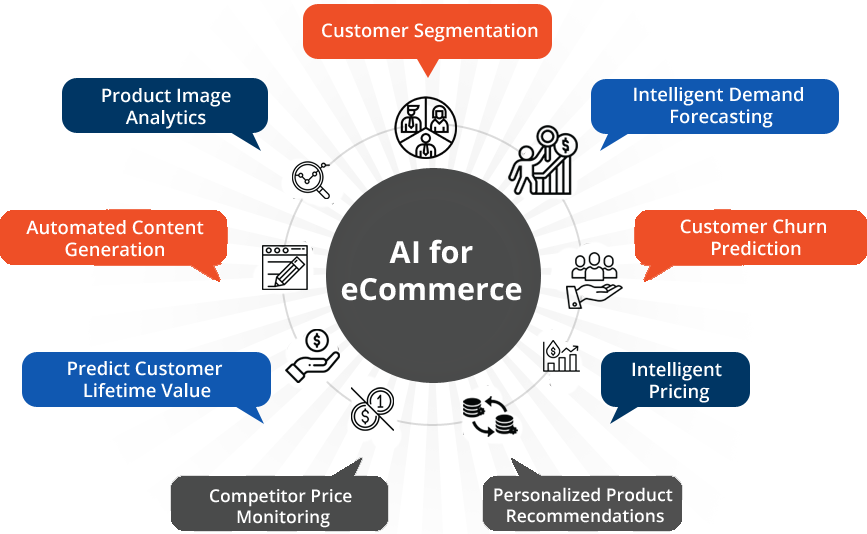
Artificial intelligence (AI) is becoming increasingly vital in improving customer experiences as the eCommerce industry grows. By leveraging AI, businesses can offer personalized experiences, streamline processes, and enhance customer satisfaction.
This section will explore how virtual assistants, customer reviews, user experience, mobile apps, and other AI-powered solutions are transforming the eCommerce industry.
We’ll also examine how AI is helping companies with customer queries, retention, and other repetitive tasks, to help you get inspiration, ultimately leading you to have better customer services and higher customer satisfaction for your business.
1. Personalized Product Recommendations
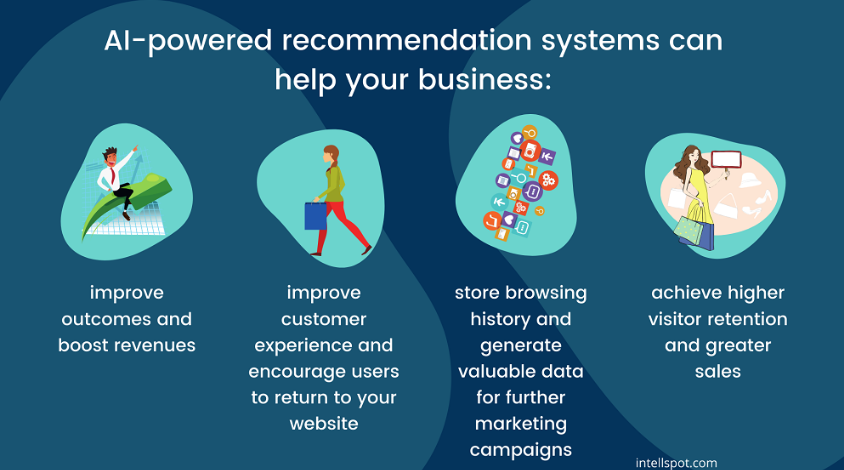
Have you ever shopped online and been pleasantly surprised by the personalized product recommendations that popped up on your screen? Well, you have AI to thank for that.
Artificial intelligence is used by retail businesses to analyze customer behavior and preferences. By leveraging customer data like purchase histories, individual customers can receive tailored suggestions for complementary products that may interest them.
This approach creates a seamless customer experience and increases customer loyalty and retention.
Additionally, AI-powered recommendation engines can provide eCommerce retailers with actionable insights into market demand, enabling them to adjust inventory levels and plan more effective marketing campaigns.
So, what does this mean for eCommerce retailers?
Let’s look at an example of an eCommerce clothing store exploring ways to offer personalized recommendations to each customer.

To do this, they create a marketing assessment lead magnet that asks customers questions about their style preferences, favorite brands, and previous purchases.
Based on their responses, the lead magnet generates a personalized clothing recommendation for each customer. Not only does this personalized experience increase customer satisfaction and loyalty, but it also allows them to offer complementary products and upsells, which increases their revenue.
This way, using AI-powered recommendation engines and analyzing customer purchase histories and market demand, eCommerce retailers can create a more seamless customer experience and optimize inventory levels.
2. AI-Powered Chatbots & Customer Service
With the rise of online shopping, it’s becoming more important than ever to meet customer demand and expectations in terms of quick and seamless customer service experiences.
AI chatbots can help with this by providing 24/7 customer satisfaction surveys, collecting feedback from customers, and helping to identify areas for improvement in real time.
Additionally, they can be programmed to address specific customer segments, allowing for more personalized interactions and a seamless customer experience.
Here’s an example of how AI-powered chatbots are used in eCommerce by a popular online retailer, H&M:

H&M, a well-known fashion brand, has implemented an AI-powered chatbot called Kik, which provides personalized style advice to customers via Facebook Messenger. Customers can interact with Kik to receive outfit recommendations, learn about new products, and even complete purchases.
Kik’s algorithms are built on natural language processing (NLP) and machine learning (ML) technologies, allowing it to understand customer inquiries and provide relevant responses. The chatbot can also recognize images, so customers can send photos of clothing items they already own and receive recommendations for complementary products.
H&M’s use of Kik has increased customer satisfaction, as the chatbot provides quick and seamless customer service that meets customer expectations. Additionally, Kik provides H&M with valuable insights into customer demand and preferences, allowing the retailer to tailor its inventory and marketing campaigns accordingly.
This way, by incorporating AI chatbots into customer service, eCommerce retailers can stay ahead of the competition and meet the evolving needs of their customers.
3. Virtual Assistants
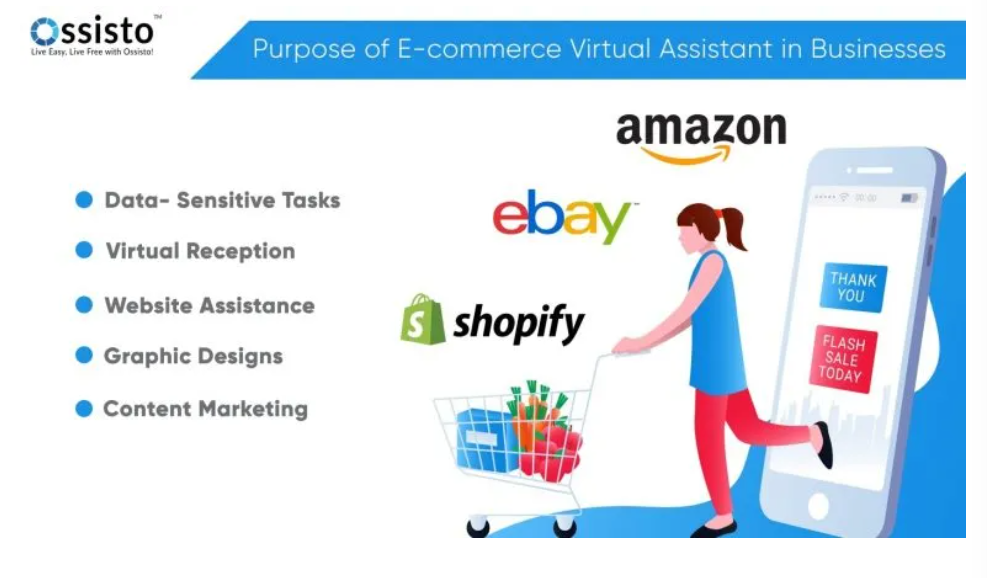
Another exciting AI use case in eCommerce is the implementation of virtual assistants. Think of them as your shopping assistants available 24/7.
These AI-powered virtual assistants are designed to simulate human conversation and provide quick and accurate responses to customer queries.
Virtual assistants are increasingly popular in eCommerce as they offer several benefits. For starters, they can handle many customer queries simultaneously, reducing the need for human intervention.
Moreover, virtual assistants can help provide personalized customer experiences by offering suggestions on product descriptions, product prices, and relevant products. By analyzing shopping patterns and sales data, virtual assistants can provide valuable insights to sales teams, streamlining the sales process and eliminating mundane tasks.
Imagine a small online store that sells handmade jewelry. The owner constantly juggles creating new products, writing product descriptions, and responding to customer queries. With limited resources and time, it becomes difficult to keep up with customer demands and provide personalized experiences.
To tackle this problem, the store owner decides to implement an AI-powered virtual assistant. The virtual assistant can help customers with their queries, recommend relevant products based on their shopping patterns and preferences, and provide valuable insights into inventory management and efficient sales processes.
By leveraging virtual assistants to help out, eCommerce businesses can stay ahead of the curve and provide their customers with the best-personalized shopping experience.
4. Sales Forecasting
Sales forecasting helps businesses plan and strategize for the future to keep growing and reaching new heights.
But here’s the thing…
Sales forecasting isn’t always easy. It involves analyzing lots of data, figuring out patterns and trends, and making predictions about the future. This is where artificial intelligence (AI) can lend its powerful capabilities to the task, providing valuable insights and predictions to help you make the best decisions for your business.
One great example is the online fashion retailer ASOS. They have implemented an AI-powered sales forecasting system to predict future sales volumes and inventory demand. This has enabled them to make smarter inventory levels, stock replenishment, and pricing decisions.

ASOS uses machine learning algorithms to analyze a wide range of data, including historical sales data, website traffic, social media trends, and customer behavior. This data is then used to create a model that can predict future sales volumes with high accuracy.
As a result, ASOS has optimized its inventory levels and reduced stockouts. They can anticipate which items will be popular and stock up accordingly while avoiding overstocking items that may not sell as well. This has helped them to minimize inventory costs and improve their profitability.
Overall, AI is a total game-changer for eCommerce businesses. It helps you stay ahead of the competition, keep your customers happy, and increase your sales.
So why not give it a try and see how it can transform your business? Who knows, you might even become an eCommerce superhero yourself.
5. Customer Segmentation
Customer segmentation divides users into distinct groups based on their characteristics, behaviors, and preferences. This allows eCommerce businesses to tailor their marketing strategies and product offerings to better meet the needs of each segment.
With the help of artificial intelligence (AI), customer segmentation has become even more effective. AI can analyze large amounts of customer data with the help of ETL data pipelines, including purchase history, browsing behavior, demographic information, and social media activity, to identify patterns and preferences.
This way, businesses can ensure that they make decisions based on accurate and reliable data, which is essential for effective customer segmentation in eCommerce.
Hence, by leveraging AI-powered customer segmentation, eCommerce businesses can:
- Target marketing campaigns: With customer segmentation data, eCommerce businesses can create targeted marketing campaigns that resonate with each segment’s unique interests and needs. This can increase the effectiveness of marketing efforts and result in higher conversion rates and sales.
- Improve customer service: AI-powered chatbots can use customer segmentation data to provide personalized and efficient customer service. By understanding each segment’s unique needs, chatbots can provide tailored responses to inquiries and reduce response times.
To help you get a clearer picture, let’s take an example of a podcast publishing platform.
Customer segmentation is a super useful tool for podcast publishers as it helps them create more personalized content and improve engagement.
Podcast publishers use customer segmentation by analyzing listener data to identify different groups based on their interests. For instance, they can analyze a podcast’s listener data to identify patterns and characteristics that distinguish different groups of listeners.
Based on the data, they might find that some listeners are more interested in organic gardening, while others are more interested in hydroponics.
Once these different groups of listeners are identified, the company can create targeted marketing campaigns that speak directly to each group’s interests and needs.
For example, they can create email marketing campaigns that promote beginner gardening tools to listeners who are interested in that topic, and advanced tools to listeners who are more experienced.
By using data-driven insights to understand their listeners and target specific segments with relevant content and advertising, podcast publishers can build stronger relationships with their audience and achieve long-term success.
6. Fighting Fake Reviews
Have you ever read an online review for a product or service and wondered if it was genuine or fake? Well, you’re not alone. Fake reviews have become a major issue in eCommerce, and many consumers are left unsure about the authenticity of the reviews they read.
Fortunately, artificial intelligence (AI) is here to help combat this problem and ensure that customers can trust the reviews they read online. With this technology, businesses can automatically generate unique product descriptions for each of their products, saving them time and resources while ensuring that their website is filled with high-quality, informative content.
Some eCommerce retailers are using artificial intelligence on their websites to fight this by emphasizing verified and helpful reviews.
Let’s take the example of Luxurymodo, a hotel review site that provides readers with unbiased reviews of the best luxury hotels. The blog relies on customer reviews to provide readers with accurate and informative feedback. However, as the blog grows in popularity, it might receive many fake reviews that bots or individuals with malicious intent post.

These fake reviews damage the blog’s credibility and make it harder for readers to find genuine feedback.
To avoid this, the blog decides to implement AI-powered tools that detect and remove fake reviews through its automated review filtering feature.
This feature allows AI to analyze reviews and identify patterns that indicate fake reviews, such as repetitive language or reviews posted from suspicious IP addresses or accounts. Once these reviews are flagged as suspicious, they are automatically removed from the platform.
Using AI-powered tools to fight off fake reviews, the luxury hotel review website can maintain its credibility and reputation as a reliable source of information. Customers can trust that the reviews they read on the website are genuine and based on actual customer experiences, which can help them make informed decisions when booking luxury hotels.
7. Smart Search
Using AI-powered algorithms to personalize search results helps customers find what they’re looking for quickly and easily.
It’s no secret that customers expect a seamless and personalized shopping experience, and smart search delivers just that. Instead of sifting through endless search results pages, customers can find the products they want with just a few clicks.
Plus, smart search provides valuable data that eCommerce businesses can use to optimize their operations and marketing strategies. It’s a win-win for customers and businesses, improving the shopping experience and providing a competitive advantage in the crowded eCommerce industry.
For instance, if we take a deeper look at the retail industry, visual search, a component of smart search, is already used where AI technology analyzes images and provides search results based on visual similarities. This allows customers to upload an image of a product they’re interested in and get visually similar results.

But how else can smart search be used to enhance a customer’s shopping experience?
Let’s say a customer visits a website that offers a cleaning business academy, and they’re interested in finding courses that specifically focus on marketing strategies for cleaning companies. Hence, a user types “marketing strategies for cleaning companies” into the search bar, and the smart search algorithm provides the user with relevant search results.
With smart search, the website provides the customer with a list of courses and resources that specifically address the topic of marketing strategies for cleaning companies. The algorithm could also personalize those results based on the user’s previous search and browsing history, providing suggestions for related topics or courses that may be of interest.
As a result, using advanced machine learning algorithms, websites that offer cleaning business academies can improve the student experience and increase engagement, ultimately leading to increased enrollment and revenue for the academy.
8. Web Design Optimization
Did you know that according to an Adobe study, websites with personalized experiences lead to an average increase of 19% in sales?
This is just one example of AI-powered web design optimization’s impact on eCommerce businesses. By using AI to personalize the shopping experience for individual users, businesses can increase engagement and loyalty and ultimately drive more sales.
Think about it – when you visit an eCommerce site, wouldn’t it be nice if it already knew our preferences and showed you products you’re more likely to be interested in? That’s the kind of personalization that AI can provide. It can also help with image optimization and chatbots, saving businesses time and resources.
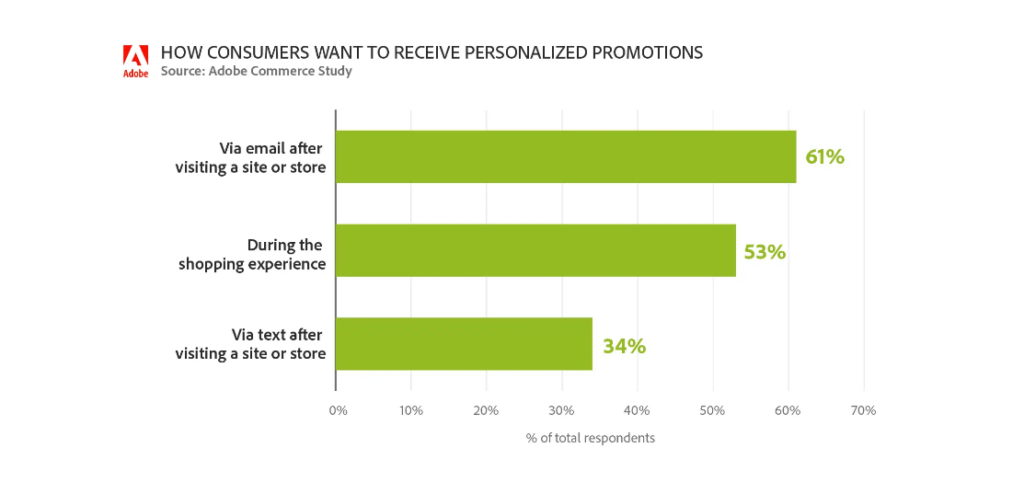
In fact, according to this survey, the majority of respondents, around 67%, expressed their desire to receive personalized promotions or offers based on their spending habits while shopping either in-store or online. At the same time, 72% of respondents who received personalized recommendations reported that they bought more products than they had initially planned.
So, how is AI used to create more dynamic and engaging web experiences?
AI uses a tracker feature. AI can track user behavior and use that data to create personalized animations that respond to user actions. For example, a button that changes color when a user hovers over it or a motion graphic that plays when a user scrolls down the page.
By using AI algorithms to automate and optimize the creation and performance of these graphics, designers can create more dynamic and engaging web experiences tailored to individual users’ needs and preferences.
Amazon is an example of a company using AI for web design optimization. Amazon has been using AI-powered recommendations for years, and this technology has been a key factor in its success as an eCommerce giant.
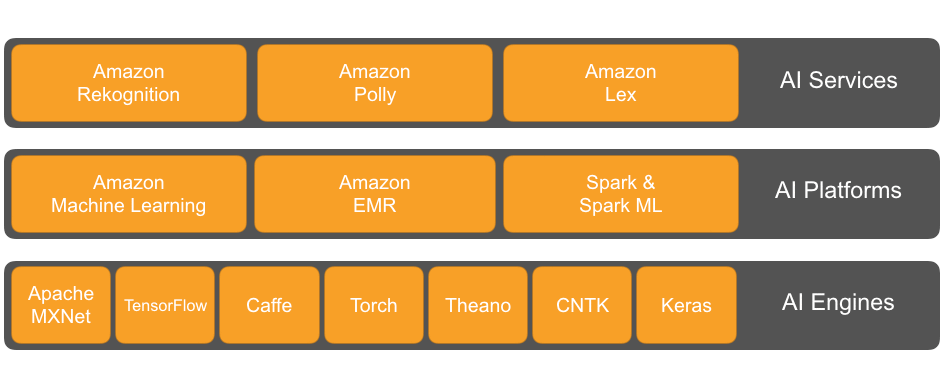
Amazon’s recommendation engine uses machine learning algorithms to analyze user behavior and make personalized product recommendations based on browsing and purchasing history. Hence, this technology is integrated into every aspect of the Amazon shopping experience, from the homepage to the product detail pages.
This way, Amazon has provided a seamless and engaging shopping experience for its customers, leading to increased sales and customer loyalty.
Conclusion
To sum up, artificial intelligence (AI) is a game-changer in eCommerce. There are so many ways in which AI can benefit both businesses and customers alike. For instance, by using AI recommendation engines, businesses can improve the customer experience and build stronger customer loyalty.
Additionally, AI can help automate tedious and time-consuming tasks, freeing up employees to focus on more valuable work.
If you want to make the most of AI for your eCommerce business, you’ll need to be ready to invest in the right technology and talent. It’s also important to be open to trying out different AI solutions and continually analyzing the results to improve your eCommerce operations.
The bottom line is that businesses willing to embrace AI’s power will have a major edge over the competition in the eCommerce market. If you’re looking for a reliable partner to help you leverage the power of AI in your eCommerce operations, look no further than our digital marketing solutions.
Our team of experts is ready to help you implement the latest AI technologies, optimize your eCommerce operations, and drive growth for your business. Contact us today to learn more about how we can help you take your business to the next level with our digital marketing services.
About the author:
Burkhard Berger is the founder of Novum™. He helps innovative B2B companies implement revenue-driven SEO strategies to scale their organic traffic to 1,000,000+ visitors per month. Curious about what your true traffic potential is?

 Return to Previous Page
Return to Previous Page








